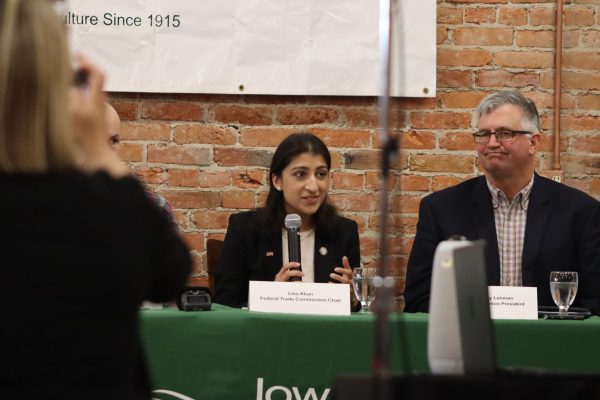Ames couple knows what it really means to be green
November 26, 2007
Frederick Kirschenmann, distinguished fellow of Iowa State’s Leopold Center for Sustainable Agriculture, and his wife, Carolyn Raffensperger, executive director of the Ames-based organization Science and Environmental Health Network, do more than preach about protecting the environment – they protect it every day of their lives.
Kirschenmann and Raffensperger have never had garbage service in their Ames home, where they have lived since 2000 after having moved from their certified organic farm in North Dakota. They recycle or make compost of most of their waste.
Raffensperger, a former archeologist, said she has been frustrated with the unnecessary and ugly garbage people leave, as it will act as a historical testimony to future archeologists.
“I wanted to stand out on the street corner and yell, ‘We need better garbage!'” she said.
Any garbage that is not recyclable, Kirschenmann said, he and his wife collect in a small bag and deposit in a public trash bin.
Raffensperger said she and her husband sometimes go a long time without any garbage, although the duration of that time varies.
She said when she worked as an archeologist, she was fascinated with what she could learn of past civilizations’ cultures by what they had left behind, such as jewelry, religious objects and storage spaces.
“You have to pity the archaeologists of the future,” Raffensperger said, mentioning Styrofoam cups and water bottles as some of society’s unnecessary waste.
Bottled water is a pet peeve for both Raffensperger and Kirschenmann, as Raffensperger said “It’s of the devil.”
“I think one of the most important things that students can do right now is to stop drinking bottled water,” Kirschenmann said. “Very often, [bottled] water is taken from places where water is a resource [for the local people]. It’s really taking from them. But more importantly, it is manufacturing this mountain of bottles.”
Kirschenmann said students can help the environment by simply asking themselves, ‘Is this something that I really need?’ and ‘Is it recyclable?’ whenever making a purchase.
“We sort of develop this throwaway society,” Kirschenmann said. “The point is, as many have pointed out, there isn’t really any ‘away.’ You throw something away, and it becomes part of the planet system.”
He said a lot of problems are out of individuals’ reach, such as many corporations not making recyclable products, but that individuals can do a lot to make a change.
Even in situations where they cannot find a recyclable version of something they need – such as a computer – asking a store manager about it can help “raise a consciousness.”
Kirschenmann said one of the most important ethical principles he has learned is to have an “ecological conscience,” a term he borrowed from Aldo Leopold, from whom the Leopold Center got its name.
“We humans are not the conquerors of the biotic community; we are simply playing members of it,” Kirschenmann said.
His wife described her motivation for protecting the environment as “deeply spiritual” and said in addition to the idea of an ecological conscience, she finds the term “moral imagination” as helpful in guiding her actions.
People use their imaginations for a range of activities, from art to personal fantasies, she said, and “moral imagination” can be used to come up with creative ways to protect the environment.
“There’s something so fun about [a moral imagination], rather than limiting,” she said.
Raffensperger described herself as “a good hunter and gatherer,” and she and her husband do their best to make sure everything they buy is – to the fullest extent possible – made in Iowa, and if possible, within 10 miles of their home.
Buying food locally is one way by which Raffensperger said she accomplishes this, but she and her husband also look for furniture made in Iowa.
Raffensperger said she also shops for clothing at Goodwill and Salvation Army, instead of purchasing newly made clothing from brands “made by sweat labor,” and described all of these activities as similar to “a treasure hunt.”
Matthew Liebman, professor of agronomy, knows Raffensperger and Kirschenmann, and he said one thing he’s learned from them is perseverance.
“[Kirschenmann] is a veteran,” Liebman said. “He’s been working for a long time, and he’s put many of [his ecological principles] into practice on his own farm.”
Kirschenmann and Raffensperger still own and manage their North Dakota farm.
“[Kirschenmann] is the personification of perseverance,” Liebman said. “He’s in it for the long haul, and so is Carolyn.”
















